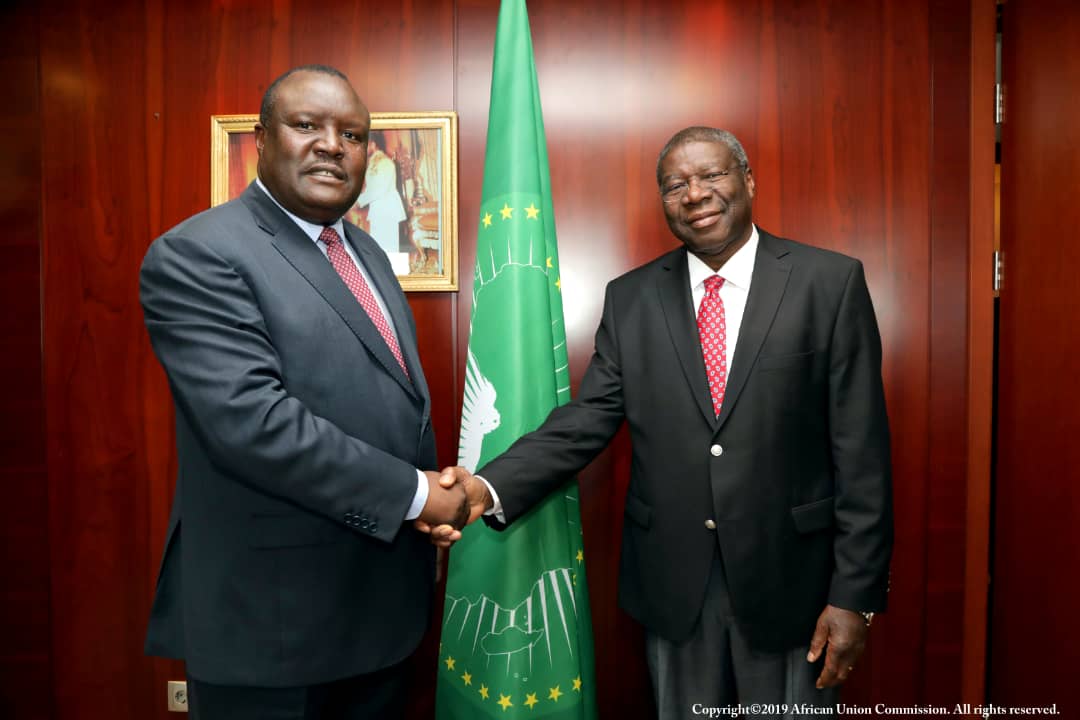The Pan-African Parliament (PAP) joined other organs and institutions of the African Union (AU) for the virtual commemoration of the 4th African Anti-Corruption Day slated for 11 July 2020. In this regard, the legislative arm of the AU held a deferred webinar on 13 July 2020 under the theme: ‘Sustaining the fight against corruption in Africa in the time of COVID-19 pandemic.’
Moderated by Hon. Ahamat Tahir AHAMAT of the PAP Committee on Audit and Public Accounts (CAPA), the webinar aimed to assess the effectiveness of anti-corruption initiatives taken in Africa, especially in the context of the COVID-19 pandemic. The panel of experts gathered for this occasion urged African Parliamentarians and relevant stakeholders to ensure that COVID-19 related emergency public spending measures adhere to the highest levels of transparency and principles of good governance.
In his opening remarks, Hon. Chief Fortune CHARUMBIRA, Vice President of the PAP, said that in addition to its health, humanitarian and socio-economic effects, the novel corona virus also poses a governance issue. He called on AU institutions and Africans at large to use the commemoration of the African Anti-Corruption Day as an incentive to enhance collaboration to ensure effective detection, tracking, reporting through to prosecution of crimes of corruption especially in the time of COVID-19 pandemic.
“Parliamentarians can play a role in curbing corruption during these difficult times by ensuring, among other things, that state institutions that are tasked with defeating corruption are adequately resourced and competent to execute their mandate. With governments taking a series of important decisions and allocating resources in the fight against COVID-19, this has created an opportunity for corrupt practices. Our engagement with stakeholders such as civil society, judiciary and anti-corruption institutions as part of this webinar will allow us to deliberate on ways to strengthen our oversight role in the fight against COVID-19,” says Hon. Charumbira.
Hon. Sefako SEEMA, Board Rapporteur attheAfrican Union Advisory Board on Corruption (AUABC) engaged the virtual meeting on the AU Convention on Preventing and Combatting Corruption (AUCPCC). He reminded that the main goal of the African Anti-corruption Day is to give prominence to the fight against corruption through the commemoration of the adoption of the AUCPCC as a mechanism for fighting corruption in Africa.
“AUCPCC was adopted in Maputo, Mozambique on 11 July 2003 and came into force in 2006. To date, it has been ratified by 44 AU Member States. Since adoption of the Convention, states have made significant strides in the fight against corruption including the enactment of national laws and the creation of anti-corruption agencies. The theme chosen by the PAP is pertinent as this year’s commemoration looked at the prevailing challenges of the COVID-19 pandemic by focusing on the demand for accountability and transparency in the utilization of resources earmarked for the management of this crisis,” says Hon. Seema.
Mr. Jeggan GREY-JOHNSON from Open Society Foundation–Africa Regional Office (OSF – AfRO) said that the current health crisis has compelled members of the PAP to optimally and effectively represent African citizens by ensuring that the massive resources poured into this pandemic serve the people through the implementation of AUCPCC among other frameworks. “This webinar gives a platform for civil society to appeal to African Parliamentarians to monitor that government responses to the crisis are sensitive to the needs of our people. COVID-19 measures require more parliamentary scrutiny. The continental Parliament has a duty to ensure that all measures taken result in enhanced protection and support of the most vulnerable through accountability and transparency.”
Mr. Paul BANOBA, Regional Advisor at Transparency International, highlighted specific corruption avenues presented by COVID- 19 and the need for concerted efforts in curbing corruption. Mr. Banoba told the webinar that the injection of sums of money into the economies by many African governments to mitigate the impact of the pandemic created situations for actors to engage in graft.” The rapid spread of the COVID-19 did not allow for proper checks and balances to be put in place in the way resources are being spent. The urgency of delivering assistance has, on many occasions, circumvented standard procedures or overlooked transparency, particularly in procurement. Participation from every stakeholder is essential in creating appropriate measures to tackle corruption with parliamentary oversight at the center of every action.”
Representing the Auditor General of the Federal Republic of Nigeria, Mr. Ayodeji OGUNYEMI, Technical Advisor, focused on evidence use and support of oversight function of Parliamentarians in combatting corruption during COVID-19. The presentation covered the relationship between parliamentary oversight and audit institutions in tackling transgressions in the ongoing context and going forward. “Audit institutions act as watchdogs for public expenditure under international Standards of Supreme Audit Institutions (SAIs). SAIs and parliaments are the two most important players for holding governments to account for the use of public funds and their mandates are complimentary. Their collaboration is crucial in delivering accountability.”
Judge Virgile Rivert SAMBA-MOUSSINGA, Co-Founder and Coordinator of the Pan-African Online Platform for Justice and Ethics (PAOP) talked about the role of an independent and credible system. He reiterated how crucial an effective justice system was in the fight against corruption. “Our capacity to eradicate corruption depends on the strength of our judicial system, acting without any interference from other powers of the state. Unfortunately, the independence of the judiciary is still fragile on the continent despite landmark rulings that recently given hopes in countries such South Africa, Malawi or Kenya. The principle of separation of powers has to be upheld to allow the judiciary to fully play its role in the fight against corruption.”
The 4th edition of the African Anti-Corruption Day was held under the theme “Fighting Corruption through Effective and Efficient Judicial Systems.” The AU declared 2018 the year of Combatting Corruption in Africa and earmarked 11 July as African Anti-Corruption day. This declaration followed a clarion call to action made by PAP, AUABC, and CSOs in 2016 to recognize the forms of corruption and eliminate opportunities that perpetuate it.






